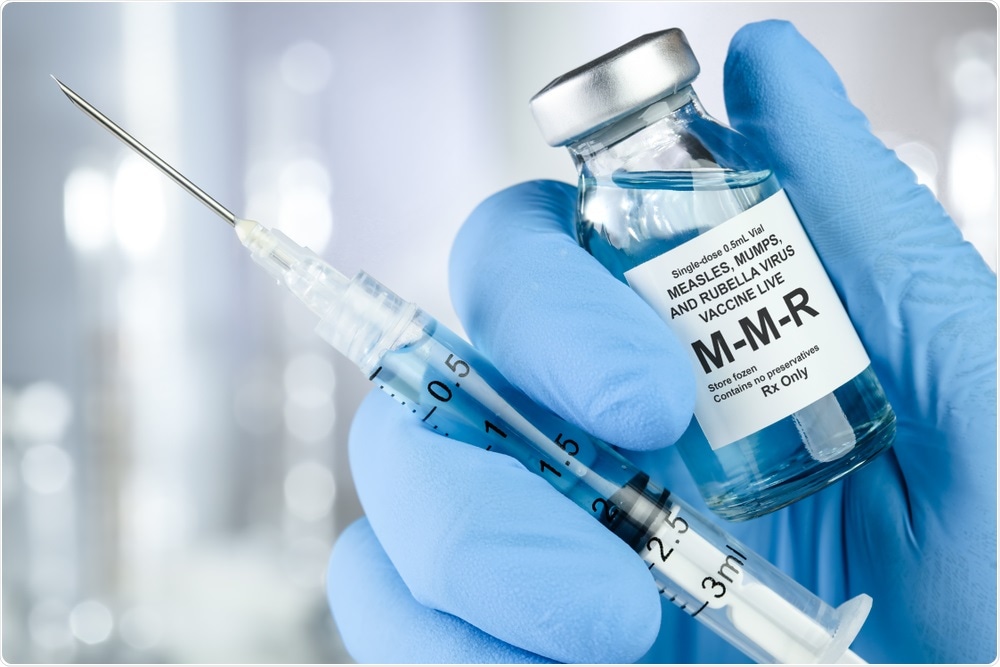According to a group of experts, the administration of the MMR (measles, mumps, and rubella) vaccine could act as a preventive measure to reduce septic inflammation linked to COVID-19 infection.

Image Credit: Leigh Prather/Shutterstock.com
The experts have reported their observations in mBio—a journal of the American Society for Microbiology.
Long-time colleagues and spouses Dr. Paul Fidel, Jr, Department Chair, Oral and Craniofacial Biology, and Associate Dean for Research, Louisiana State University Health School of Dentistry, and Dr. Mairi Noverr, Professor of Microbiology & Immunology at Tulane University School of Medicine based in New Orleans, co-authored the new perspective article on the basis of the ideas originating from research in their laboratories.
According to scientists, vaccination with MMR in immunocompetent persons has no contraindications and may be specifically effective for health care staff who can easily be exposed to COVID-19 infection.
Live attenuated vaccines seemingly have some nonspecific benefits as well as immunity to the target pathogen. A clinical trial with MMR in high-risk populations may provide a low-risk-high-reward preventive measure in saving lives during the COVID-19 pandemic.”
Paul Fidel, Jr, Department Chair, Oral and Craniofacial Biology, Louisiana State University Health School of Dentistry
Fidel added, “While we are conducting the clinical trials, I don’t think it’s going to hurt anybody to have an MMR vaccine that would protect against the measles, mumps, and rubella with this potential added benefit of helping against COVID-19.”
Growing evidence shows that live attenuated vaccines offer non-specific protection against dangerous infections—unassociated with the target pathogen of the vaccine—by inducing trained non-specific innate immune cells for enhanced host reactions against further infections.
Such live attenuated vaccines induce non-specific effects that represent “trained innate immunity” by instructing leukocyte, or immune system cells, precursors present in the bone marrow to work more efficiently against wider infectious insults.
In association with Dr Fidel and in Dr Noverr’s laboratory, vaccination with a live attenuated fungal strain provided trained innate protection against lethal polymicrobial sepsis. This protection was mediated by long-lasting myeloid-derived suppressor cells (MDSCs) that were earlier reported to suppress mortality and septic inflammation in a number of experimental models.
According to the scientists, an MMR vaccine should be able to promote MDSCs that can reduce or prevent severe lung inflammation/sepsis related to COVID-19. Mortality rates in COVID-19 cases are strongly related to progressive lung inflammation and ultimate sepsis.
Current events offer support for the scientists’ hypothesis. The milder symptoms observed in the 955 sailors on the U.S.S Roosevelt who tested positive for COVID-19 infection, with just one hospitalization, could have been tied to the fact that the MMR vaccinations are administrated to all U.S. Navy recruits.
Additionally, epidemiological data implies an association between individuals in geographical areas who regularly receive the MMR vaccine and decreased COVID-19 death rates.
With regard to children, COVID-19 did not have a huge impact. The scientists hypothesized that a major reason children are protected from viral infections that cause sepsis is their more recent and regular exposures to live attenuated vaccines that can also promote the trained suppressive MDSCs that restrict sepsis and inflammation.
The scientists have proposed a clinical trial to find out if the MMR vaccine can protect against the COVID-19 infection. But meanwhile, they have suggested that all adults, particularly health care workers and persons in nursing homes should receive the MMR vaccine.
If adults got the MMR as a child they likely still have some level of antibodies against measles, mumps, and rubella, but probably not the myeloid-derived suppressor cells. While the MDSCs are long-lived, they are not life-long cells. So, a booster MMR would enhance the antibodies to measles, mumps, and rubella and reinitiate the MDSCs.”
Paul Fidel, Jr, Department Chair, Oral and Craniofacial Biology, Louisiana State University Health School of Dentistry
“We would hope that the MDSCs induced by the MMR would have a fairly good life-span to get through the critical time of the pandemic,” Fidel, Jr concluded.
Dr Noverr recently received a “Fast Grant”—part of Emergent Ventures at the Mercatus Center, George Mason University—to examine the efficacy of MMR directly in a nonhuman primate model of COVID-19 infection.